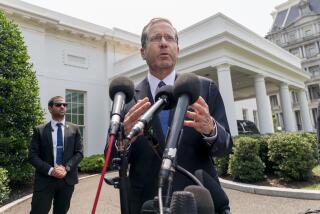Lift Travel Curbs, U.S. Urges Soviets : Mutual Freedom of Movement for Diplomats Suggested
- Share via
WASHINGTON — The United States will propose to the Soviet Union lifting virtually all restrictions on travel by diplomats, trade representatives and journalists imposed during the Stalin era, Bush Administration officials disclosed today.
The “Open Lands” initiative surfaced as Soviet Foreign Minister Eduard A. Shevardnadze opened high-level talks with President Bush at the White House. He carried with him still-secret proposals from Moscow that could accelerate reductions in the superpowers’ nuclear missile arsenals.
Nearly 90% of the Soviet Union is now off limits to Americans, reflecting the suspicions that marked Josef Stalin’s rule. The United States responded through the years to the curbs by imposing similar restrictions on a large part of the United States.
FBI Approval
The Washington Times first reported the removal of the travel restrictions in today’s editions.
The FBI has approved the proposal and it is ready for Secretary of State James A. Baker III to present to Shevardnadze during their talks Friday and Saturday in Jackson Hole, Wyo., the officials said.
If it is adopted, however, Soviets still will have to register their travel plans with the State Department’s Office of Foreign Missions.
This is designed to address security concerns, said the officials, who spoke on condition of anonymity.
In practice, Americans and Soviets occasionally are granted permission to enter the prohibited zones. For instance, Soviet Ambassador Yuri V. Dubinin was permitted to visit off-limits parts of the United States several dozen times.
‘Open Lands’ Proposal
It was not known how the Soviets would respond. But the “Open Lands” proposal obviously had in mind the more open policies of Soviet President Mikhail S. Gorbachev.
“The idea is to abolish the curbs on a reciprocal basis so travel theoretically is permitted everywhere,” an official said.
Even before Bush received the message Shevardnadze brought from Gorbachev, the two sides had made significant progress on three fronts: human rights, chemical weapons and breaking the “Ice Curtain” that has divided Alaskan and Siberian Eskimos for more than 40 years.
“Mikhail Gorbachev’s letter contains some very important proposals, specifically, mostly on arms control and on reducing the military standoff between our two countries,” he said through an interpreter.
More to Read
Sign up for Essential California
The most important California stories and recommendations in your inbox every morning.
You may occasionally receive promotional content from the Los Angeles Times.













